University Law Module: Critical Analysis of Case Law in Legal Systems
VerifiedAdded on 2020/10/23
|8
|2178
|343
Essay
AI Summary
This essay critically evaluates the statement that case law plays a central role in all legal systems. It begins by defining legal systems and outlining the four basic types: civil, common, religious, or a combination thereof. The essay then focuses on the common law system, contrasting it with the civil law model, particularly within the context of China's legal system. It explores the advantages of case law, such as its flexibility and adaptability, while also acknowledging its disadvantages, including the lack of public input in law formation and the potential for uncertainty. The analysis includes discussions on the separation of powers, judicial precedents, and the application of common law in addressing unforeseen circumstances. The essay concludes by summarizing the benefits and drawbacks of relying on case law in legal structures, emphasizing the need for a balanced approach.
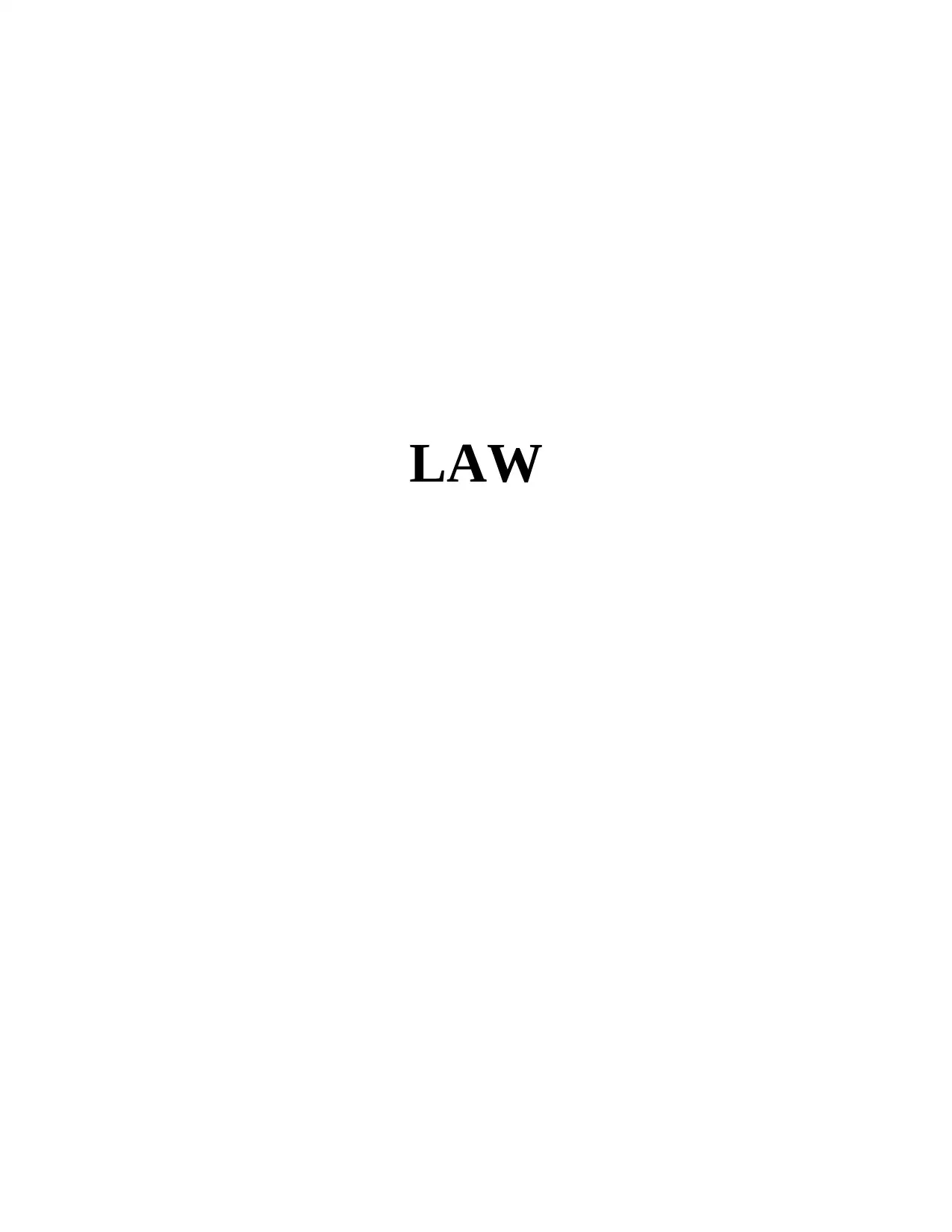
LAW
Paraphrase This Document
Need a fresh take? Get an instant paraphrase of this document with our AI Paraphraser
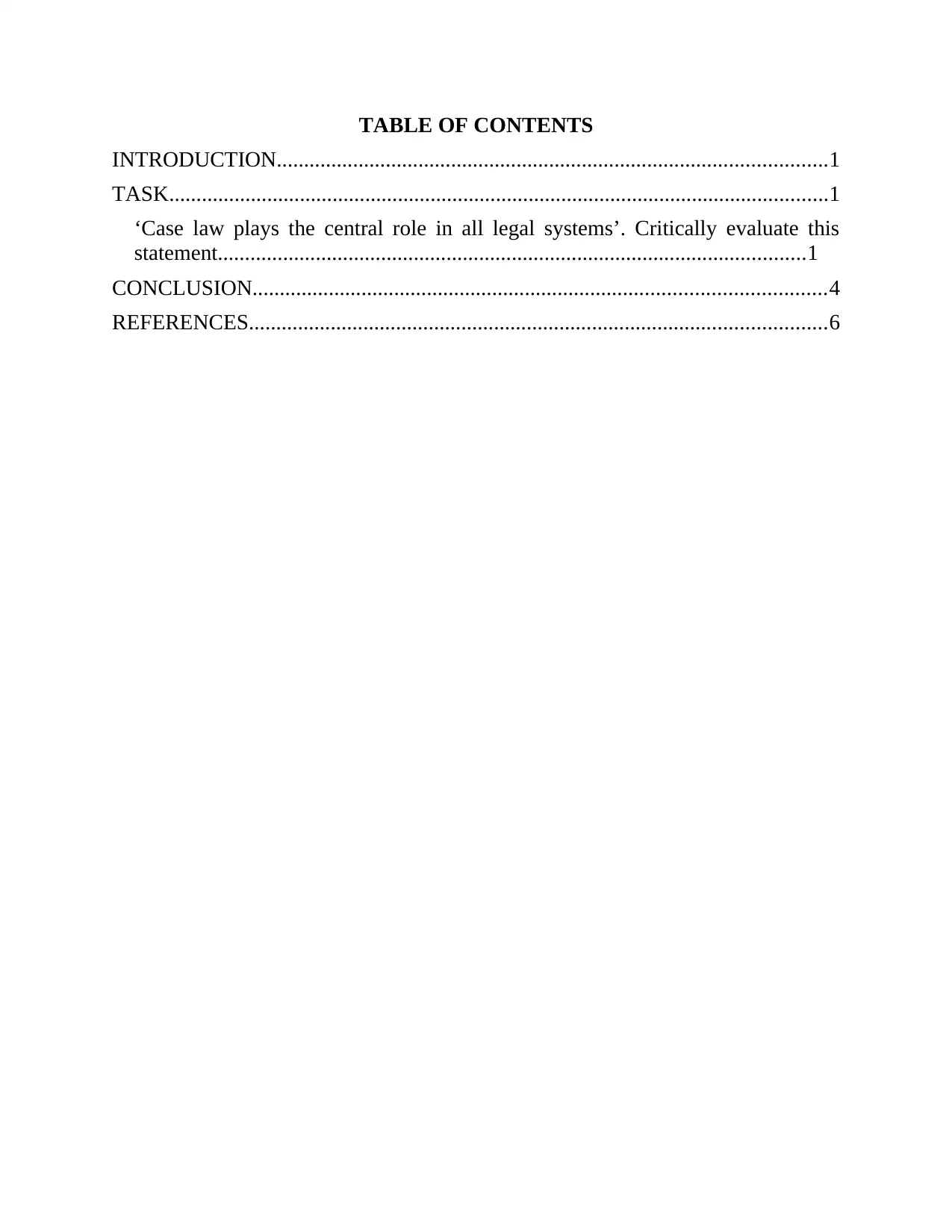
TABLE OF CONTENTS
INTRODUCTION.....................................................................................................1
TASK.........................................................................................................................1
‘Case law plays the central role in all legal systems’. Critically evaluate this
statement............................................................................................................1
CONCLUSION.........................................................................................................4
REFERENCES..........................................................................................................6
INTRODUCTION.....................................................................................................1
TASK.........................................................................................................................1
‘Case law plays the central role in all legal systems’. Critically evaluate this
statement............................................................................................................1
CONCLUSION.........................................................................................................4
REFERENCES..........................................................................................................6
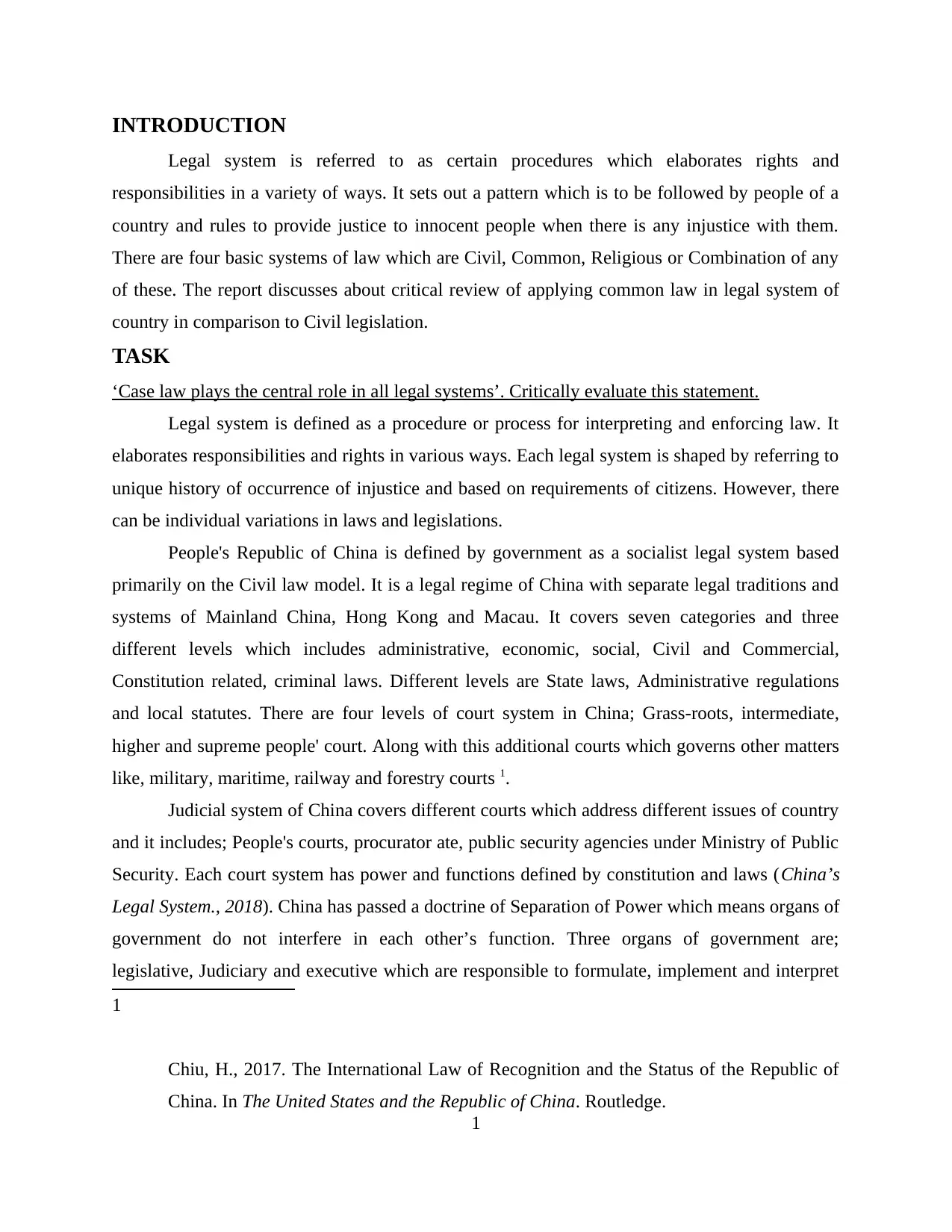
INTRODUCTION
Legal system is referred to as certain procedures which elaborates rights and
responsibilities in a variety of ways. It sets out a pattern which is to be followed by people of a
country and rules to provide justice to innocent people when there is any injustice with them.
There are four basic systems of law which are Civil, Common, Religious or Combination of any
of these. The report discusses about critical review of applying common law in legal system of
country in comparison to Civil legislation.
TASK
‘Case law plays the central role in all legal systems’. Critically evaluate this statement.
Legal system is defined as a procedure or process for interpreting and enforcing law. It
elaborates responsibilities and rights in various ways. Each legal system is shaped by referring to
unique history of occurrence of injustice and based on requirements of citizens. However, there
can be individual variations in laws and legislations.
People's Republic of China is defined by government as a socialist legal system based
primarily on the Civil law model. It is a legal regime of China with separate legal traditions and
systems of Mainland China, Hong Kong and Macau. It covers seven categories and three
different levels which includes administrative, economic, social, Civil and Commercial,
Constitution related, criminal laws. Different levels are State laws, Administrative regulations
and local statutes. There are four levels of court system in China; Grass-roots, intermediate,
higher and supreme people' court. Along with this additional courts which governs other matters
like, military, maritime, railway and forestry courts 1.
Judicial system of China covers different courts which address different issues of country
and it includes; People's courts, procurator ate, public security agencies under Ministry of Public
Security. Each court system has power and functions defined by constitution and laws (China’s
Legal System., 2018). China has passed a doctrine of Separation of Power which means organs of
government do not interfere in each other’s function. Three organs of government are;
legislative, Judiciary and executive which are responsible to formulate, implement and interpret
1
Chiu, H., 2017. The International Law of Recognition and the Status of the Republic of
China. In The United States and the Republic of China. Routledge.
1
Legal system is referred to as certain procedures which elaborates rights and
responsibilities in a variety of ways. It sets out a pattern which is to be followed by people of a
country and rules to provide justice to innocent people when there is any injustice with them.
There are four basic systems of law which are Civil, Common, Religious or Combination of any
of these. The report discusses about critical review of applying common law in legal system of
country in comparison to Civil legislation.
TASK
‘Case law plays the central role in all legal systems’. Critically evaluate this statement.
Legal system is defined as a procedure or process for interpreting and enforcing law. It
elaborates responsibilities and rights in various ways. Each legal system is shaped by referring to
unique history of occurrence of injustice and based on requirements of citizens. However, there
can be individual variations in laws and legislations.
People's Republic of China is defined by government as a socialist legal system based
primarily on the Civil law model. It is a legal regime of China with separate legal traditions and
systems of Mainland China, Hong Kong and Macau. It covers seven categories and three
different levels which includes administrative, economic, social, Civil and Commercial,
Constitution related, criminal laws. Different levels are State laws, Administrative regulations
and local statutes. There are four levels of court system in China; Grass-roots, intermediate,
higher and supreme people' court. Along with this additional courts which governs other matters
like, military, maritime, railway and forestry courts 1.
Judicial system of China covers different courts which address different issues of country
and it includes; People's courts, procurator ate, public security agencies under Ministry of Public
Security. Each court system has power and functions defined by constitution and laws (China’s
Legal System., 2018). China has passed a doctrine of Separation of Power which means organs of
government do not interfere in each other’s function. Three organs of government are;
legislative, Judiciary and executive which are responsible to formulate, implement and interpret
1
Chiu, H., 2017. The International Law of Recognition and the Status of the Republic of
China. In The United States and the Republic of China. Routledge.
1
⊘ This is a preview!⊘
Do you want full access?
Subscribe today to unlock all pages.

Trusted by 1+ million students worldwide
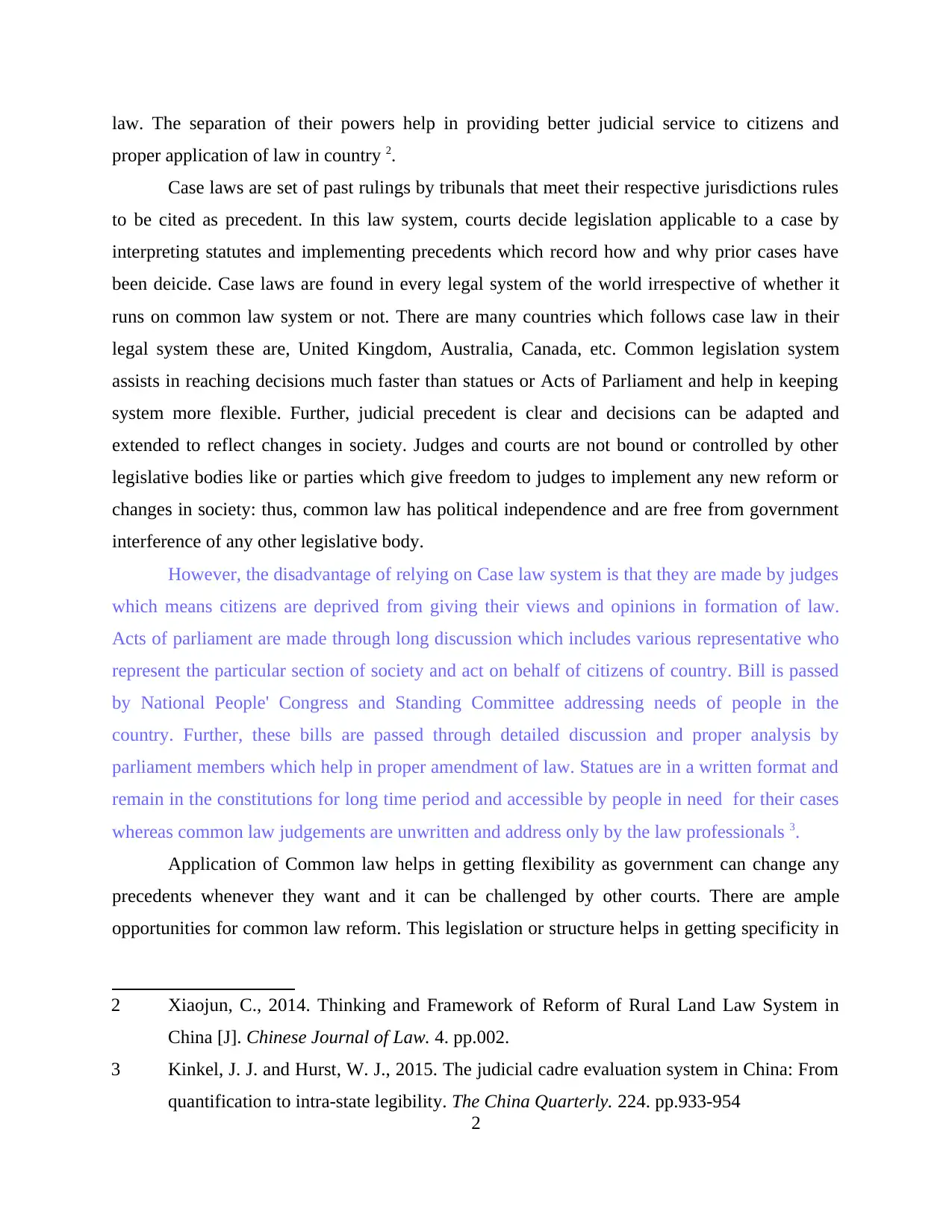
law. The separation of their powers help in providing better judicial service to citizens and
proper application of law in country 2.
Case laws are set of past rulings by tribunals that meet their respective jurisdictions rules
to be cited as precedent. In this law system, courts decide legislation applicable to a case by
interpreting statutes and implementing precedents which record how and why prior cases have
been deicide. Case laws are found in every legal system of the world irrespective of whether it
runs on common law system or not. There are many countries which follows case law in their
legal system these are, United Kingdom, Australia, Canada, etc. Common legislation system
assists in reaching decisions much faster than statues or Acts of Parliament and help in keeping
system more flexible. Further, judicial precedent is clear and decisions can be adapted and
extended to reflect changes in society. Judges and courts are not bound or controlled by other
legislative bodies like or parties which give freedom to judges to implement any new reform or
changes in society: thus, common law has political independence and are free from government
interference of any other legislative body.
However, the disadvantage of relying on Case law system is that they are made by judges
which means citizens are deprived from giving their views and opinions in formation of law.
Acts of parliament are made through long discussion which includes various representative who
represent the particular section of society and act on behalf of citizens of country. Bill is passed
by National People' Congress and Standing Committee addressing needs of people in the
country. Further, these bills are passed through detailed discussion and proper analysis by
parliament members which help in proper amendment of law. Statues are in a written format and
remain in the constitutions for long time period and accessible by people in need for their cases
whereas common law judgements are unwritten and address only by the law professionals 3.
Application of Common law helps in getting flexibility as government can change any
precedents whenever they want and it can be challenged by other courts. There are ample
opportunities for common law reform. This legislation or structure helps in getting specificity in
2 Xiaojun, C., 2014. Thinking and Framework of Reform of Rural Land Law System in
China [J]. Chinese Journal of Law. 4. pp.002.
3 Kinkel, J. J. and Hurst, W. J., 2015. The judicial cadre evaluation system in China: From
quantification to intra-state legibility. The China Quarterly. 224. pp.933-954
2
proper application of law in country 2.
Case laws are set of past rulings by tribunals that meet their respective jurisdictions rules
to be cited as precedent. In this law system, courts decide legislation applicable to a case by
interpreting statutes and implementing precedents which record how and why prior cases have
been deicide. Case laws are found in every legal system of the world irrespective of whether it
runs on common law system or not. There are many countries which follows case law in their
legal system these are, United Kingdom, Australia, Canada, etc. Common legislation system
assists in reaching decisions much faster than statues or Acts of Parliament and help in keeping
system more flexible. Further, judicial precedent is clear and decisions can be adapted and
extended to reflect changes in society. Judges and courts are not bound or controlled by other
legislative bodies like or parties which give freedom to judges to implement any new reform or
changes in society: thus, common law has political independence and are free from government
interference of any other legislative body.
However, the disadvantage of relying on Case law system is that they are made by judges
which means citizens are deprived from giving their views and opinions in formation of law.
Acts of parliament are made through long discussion which includes various representative who
represent the particular section of society and act on behalf of citizens of country. Bill is passed
by National People' Congress and Standing Committee addressing needs of people in the
country. Further, these bills are passed through detailed discussion and proper analysis by
parliament members which help in proper amendment of law. Statues are in a written format and
remain in the constitutions for long time period and accessible by people in need for their cases
whereas common law judgements are unwritten and address only by the law professionals 3.
Application of Common law helps in getting flexibility as government can change any
precedents whenever they want and it can be challenged by other courts. There are ample
opportunities for common law reform. This legislation or structure helps in getting specificity in
2 Xiaojun, C., 2014. Thinking and Framework of Reform of Rural Land Law System in
China [J]. Chinese Journal of Law. 4. pp.002.
3 Kinkel, J. J. and Hurst, W. J., 2015. The judicial cadre evaluation system in China: From
quantification to intra-state legibility. The China Quarterly. 224. pp.933-954
2
Paraphrase This Document
Need a fresh take? Get an instant paraphrase of this document with our AI Paraphraser
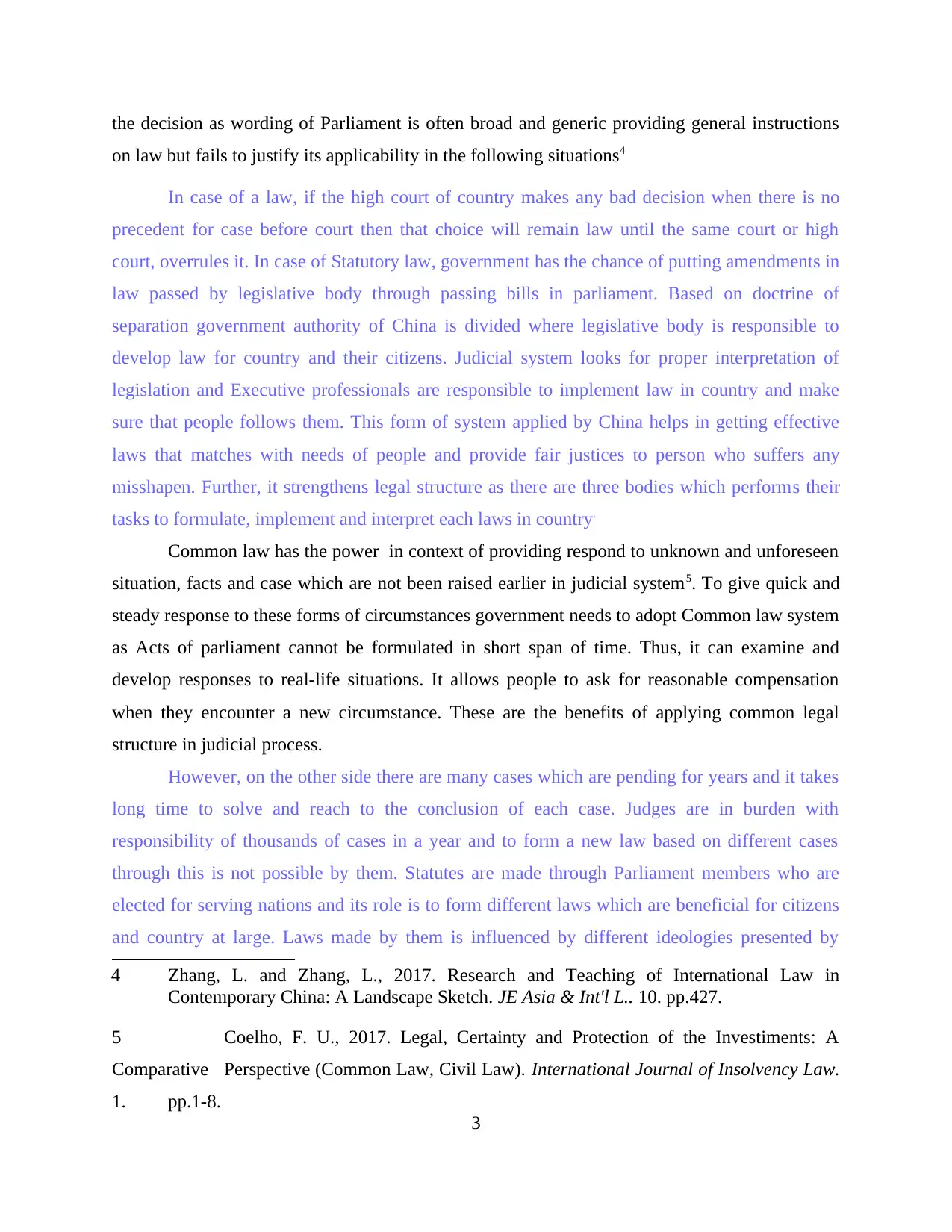
the decision as wording of Parliament is often broad and generic providing general instructions
on law but fails to justify its applicability in the following situations4
In case of a law, if the high court of country makes any bad decision when there is no
precedent for case before court then that choice will remain law until the same court or high
court, overrules it. In case of Statutory law, government has the chance of putting amendments in
law passed by legislative body through passing bills in parliament. Based on doctrine of
separation government authority of China is divided where legislative body is responsible to
develop law for country and their citizens. Judicial system looks for proper interpretation of
legislation and Executive professionals are responsible to implement law in country and make
sure that people follows them. This form of system applied by China helps in getting effective
laws that matches with needs of people and provide fair justices to person who suffers any
misshapen. Further, it strengthens legal structure as there are three bodies which performs their
tasks to formulate, implement and interpret each laws in country.
Common law has the power in context of providing respond to unknown and unforeseen
situation, facts and case which are not been raised earlier in judicial system5. To give quick and
steady response to these forms of circumstances government needs to adopt Common law system
as Acts of parliament cannot be formulated in short span of time. Thus, it can examine and
develop responses to real-life situations. It allows people to ask for reasonable compensation
when they encounter a new circumstance. These are the benefits of applying common legal
structure in judicial process.
However, on the other side there are many cases which are pending for years and it takes
long time to solve and reach to the conclusion of each case. Judges are in burden with
responsibility of thousands of cases in a year and to form a new law based on different cases
through this is not possible by them. Statutes are made through Parliament members who are
elected for serving nations and its role is to form different laws which are beneficial for citizens
and country at large. Laws made by them is influenced by different ideologies presented by
4 Zhang, L. and Zhang, L., 2017. Research and Teaching of International Law in
Contemporary China: A Landscape Sketch. JE Asia & Int'l L.. 10. pp.427.
5 Coelho, F. U., 2017. Legal, Certainty and Protection of the Investiments: A
Comparative Perspective (Common Law, Civil Law). International Journal of Insolvency Law.
1. pp.1-8.
3
on law but fails to justify its applicability in the following situations4
In case of a law, if the high court of country makes any bad decision when there is no
precedent for case before court then that choice will remain law until the same court or high
court, overrules it. In case of Statutory law, government has the chance of putting amendments in
law passed by legislative body through passing bills in parliament. Based on doctrine of
separation government authority of China is divided where legislative body is responsible to
develop law for country and their citizens. Judicial system looks for proper interpretation of
legislation and Executive professionals are responsible to implement law in country and make
sure that people follows them. This form of system applied by China helps in getting effective
laws that matches with needs of people and provide fair justices to person who suffers any
misshapen. Further, it strengthens legal structure as there are three bodies which performs their
tasks to formulate, implement and interpret each laws in country.
Common law has the power in context of providing respond to unknown and unforeseen
situation, facts and case which are not been raised earlier in judicial system5. To give quick and
steady response to these forms of circumstances government needs to adopt Common law system
as Acts of parliament cannot be formulated in short span of time. Thus, it can examine and
develop responses to real-life situations. It allows people to ask for reasonable compensation
when they encounter a new circumstance. These are the benefits of applying common legal
structure in judicial process.
However, on the other side there are many cases which are pending for years and it takes
long time to solve and reach to the conclusion of each case. Judges are in burden with
responsibility of thousands of cases in a year and to form a new law based on different cases
through this is not possible by them. Statutes are made through Parliament members who are
elected for serving nations and its role is to form different laws which are beneficial for citizens
and country at large. Laws made by them is influenced by different ideologies presented by
4 Zhang, L. and Zhang, L., 2017. Research and Teaching of International Law in
Contemporary China: A Landscape Sketch. JE Asia & Int'l L.. 10. pp.427.
5 Coelho, F. U., 2017. Legal, Certainty and Protection of the Investiments: A
Comparative Perspective (Common Law, Civil Law). International Journal of Insolvency Law.
1. pp.1-8.
3
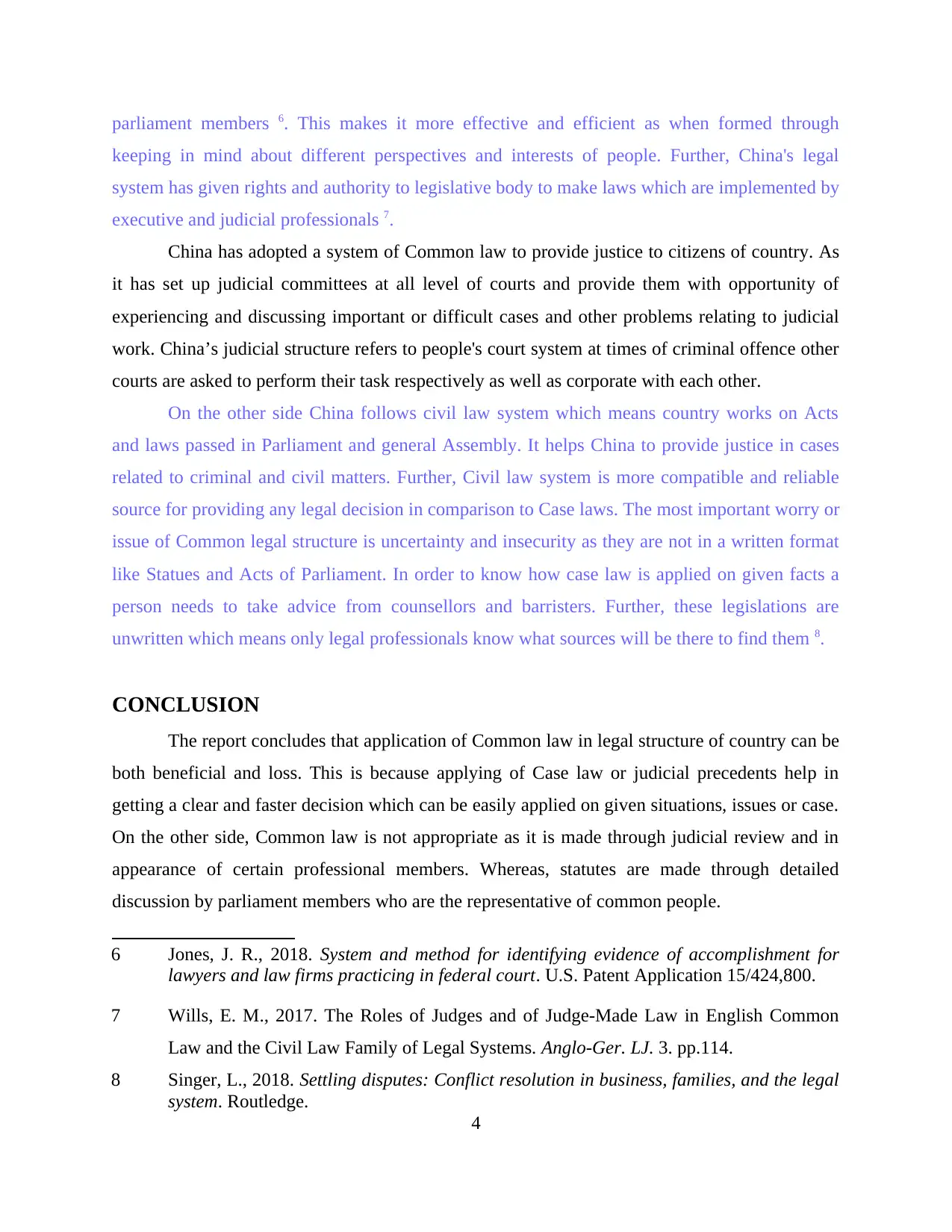
parliament members 6. This makes it more effective and efficient as when formed through
keeping in mind about different perspectives and interests of people. Further, China's legal
system has given rights and authority to legislative body to make laws which are implemented by
executive and judicial professionals 7.
China has adopted a system of Common law to provide justice to citizens of country. As
it has set up judicial committees at all level of courts and provide them with opportunity of
experiencing and discussing important or difficult cases and other problems relating to judicial
work. China’s judicial structure refers to people's court system at times of criminal offence other
courts are asked to perform their task respectively as well as corporate with each other.
On the other side China follows civil law system which means country works on Acts
and laws passed in Parliament and general Assembly. It helps China to provide justice in cases
related to criminal and civil matters. Further, Civil law system is more compatible and reliable
source for providing any legal decision in comparison to Case laws. The most important worry or
issue of Common legal structure is uncertainty and insecurity as they are not in a written format
like Statues and Acts of Parliament. In order to know how case law is applied on given facts a
person needs to take advice from counsellors and barristers. Further, these legislations are
unwritten which means only legal professionals know what sources will be there to find them 8.
CONCLUSION
The report concludes that application of Common law in legal structure of country can be
both beneficial and loss. This is because applying of Case law or judicial precedents help in
getting a clear and faster decision which can be easily applied on given situations, issues or case.
On the other side, Common law is not appropriate as it is made through judicial review and in
appearance of certain professional members. Whereas, statutes are made through detailed
discussion by parliament members who are the representative of common people.
6 Jones, J. R., 2018. System and method for identifying evidence of accomplishment for
lawyers and law firms practicing in federal court. U.S. Patent Application 15/424,800.
7 Wills, E. M., 2017. The Roles of Judges and of Judge-Made Law in English Common
Law and the Civil Law Family of Legal Systems. Anglo-Ger. LJ. 3. pp.114.
8 Singer, L., 2018. Settling disputes: Conflict resolution in business, families, and the legal
system. Routledge.
4
keeping in mind about different perspectives and interests of people. Further, China's legal
system has given rights and authority to legislative body to make laws which are implemented by
executive and judicial professionals 7.
China has adopted a system of Common law to provide justice to citizens of country. As
it has set up judicial committees at all level of courts and provide them with opportunity of
experiencing and discussing important or difficult cases and other problems relating to judicial
work. China’s judicial structure refers to people's court system at times of criminal offence other
courts are asked to perform their task respectively as well as corporate with each other.
On the other side China follows civil law system which means country works on Acts
and laws passed in Parliament and general Assembly. It helps China to provide justice in cases
related to criminal and civil matters. Further, Civil law system is more compatible and reliable
source for providing any legal decision in comparison to Case laws. The most important worry or
issue of Common legal structure is uncertainty and insecurity as they are not in a written format
like Statues and Acts of Parliament. In order to know how case law is applied on given facts a
person needs to take advice from counsellors and barristers. Further, these legislations are
unwritten which means only legal professionals know what sources will be there to find them 8.
CONCLUSION
The report concludes that application of Common law in legal structure of country can be
both beneficial and loss. This is because applying of Case law or judicial precedents help in
getting a clear and faster decision which can be easily applied on given situations, issues or case.
On the other side, Common law is not appropriate as it is made through judicial review and in
appearance of certain professional members. Whereas, statutes are made through detailed
discussion by parliament members who are the representative of common people.
6 Jones, J. R., 2018. System and method for identifying evidence of accomplishment for
lawyers and law firms practicing in federal court. U.S. Patent Application 15/424,800.
7 Wills, E. M., 2017. The Roles of Judges and of Judge-Made Law in English Common
Law and the Civil Law Family of Legal Systems. Anglo-Ger. LJ. 3. pp.114.
8 Singer, L., 2018. Settling disputes: Conflict resolution in business, families, and the legal
system. Routledge.
4
⊘ This is a preview!⊘
Do you want full access?
Subscribe today to unlock all pages.

Trusted by 1+ million students worldwide

5
Paraphrase This Document
Need a fresh take? Get an instant paraphrase of this document with our AI Paraphraser
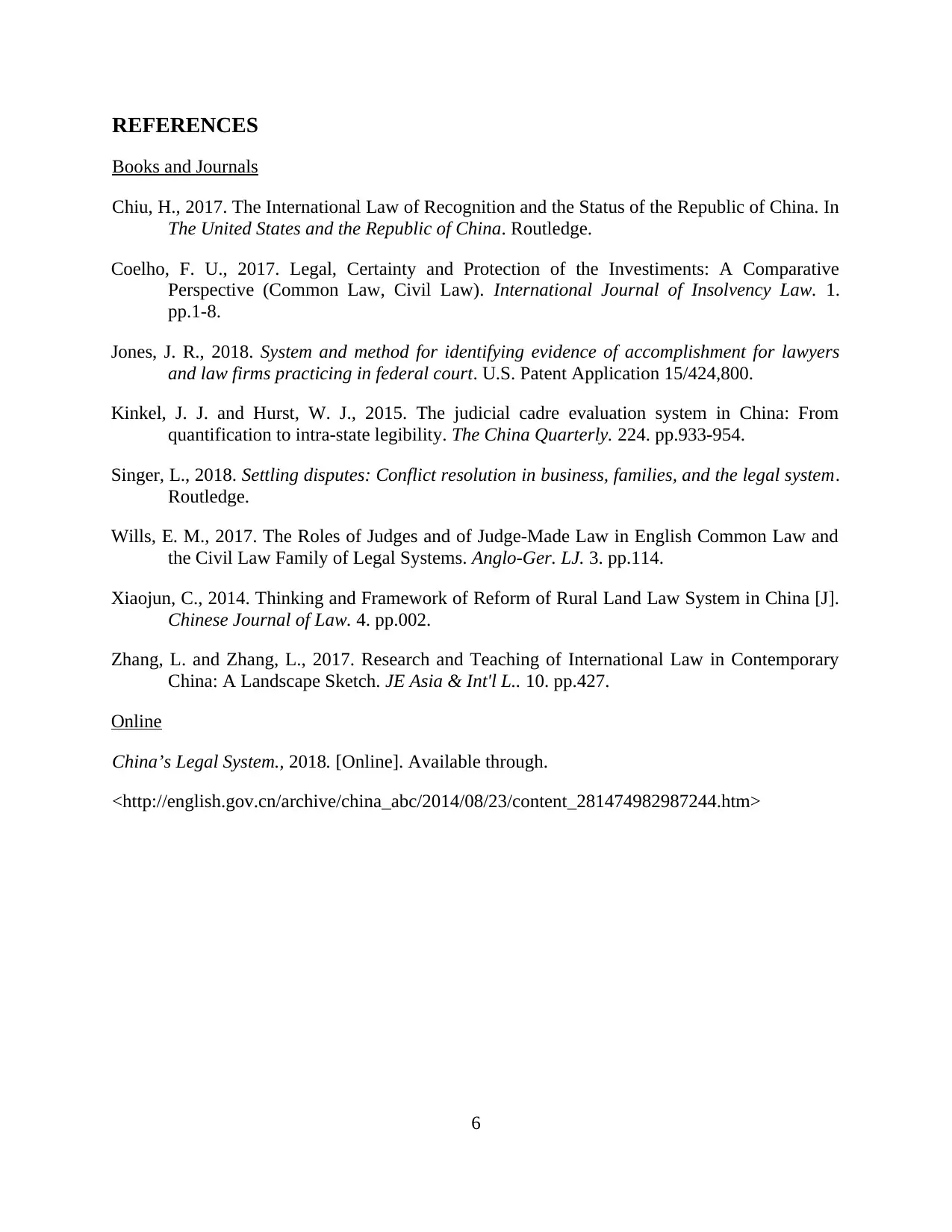
REFERENCES
Books and Journals
Chiu, H., 2017. The International Law of Recognition and the Status of the Republic of China. In
The United States and the Republic of China. Routledge.
Coelho, F. U., 2017. Legal, Certainty and Protection of the Investiments: A Comparative
Perspective (Common Law, Civil Law). International Journal of Insolvency Law. 1.
pp.1-8.
Jones, J. R., 2018. System and method for identifying evidence of accomplishment for lawyers
and law firms practicing in federal court. U.S. Patent Application 15/424,800.
Kinkel, J. J. and Hurst, W. J., 2015. The judicial cadre evaluation system in China: From
quantification to intra-state legibility. The China Quarterly. 224. pp.933-954.
Singer, L., 2018. Settling disputes: Conflict resolution in business, families, and the legal system.
Routledge.
Wills, E. M., 2017. The Roles of Judges and of Judge-Made Law in English Common Law and
the Civil Law Family of Legal Systems. Anglo-Ger. LJ. 3. pp.114.
Xiaojun, C., 2014. Thinking and Framework of Reform of Rural Land Law System in China [J].
Chinese Journal of Law. 4. pp.002.
Zhang, L. and Zhang, L., 2017. Research and Teaching of International Law in Contemporary
China: A Landscape Sketch. JE Asia & Int'l L.. 10. pp.427.
Online
China’s Legal System., 2018. [Online]. Available through.
<http://english.gov.cn/archive/china_abc/2014/08/23/content_281474982987244.htm>
6
Books and Journals
Chiu, H., 2017. The International Law of Recognition and the Status of the Republic of China. In
The United States and the Republic of China. Routledge.
Coelho, F. U., 2017. Legal, Certainty and Protection of the Investiments: A Comparative
Perspective (Common Law, Civil Law). International Journal of Insolvency Law. 1.
pp.1-8.
Jones, J. R., 2018. System and method for identifying evidence of accomplishment for lawyers
and law firms practicing in federal court. U.S. Patent Application 15/424,800.
Kinkel, J. J. and Hurst, W. J., 2015. The judicial cadre evaluation system in China: From
quantification to intra-state legibility. The China Quarterly. 224. pp.933-954.
Singer, L., 2018. Settling disputes: Conflict resolution in business, families, and the legal system.
Routledge.
Wills, E. M., 2017. The Roles of Judges and of Judge-Made Law in English Common Law and
the Civil Law Family of Legal Systems. Anglo-Ger. LJ. 3. pp.114.
Xiaojun, C., 2014. Thinking and Framework of Reform of Rural Land Law System in China [J].
Chinese Journal of Law. 4. pp.002.
Zhang, L. and Zhang, L., 2017. Research and Teaching of International Law in Contemporary
China: A Landscape Sketch. JE Asia & Int'l L.. 10. pp.427.
Online
China’s Legal System., 2018. [Online]. Available through.
<http://english.gov.cn/archive/china_abc/2014/08/23/content_281474982987244.htm>
6
1 out of 8
Related Documents
Your All-in-One AI-Powered Toolkit for Academic Success.
+13062052269
info@desklib.com
Available 24*7 on WhatsApp / Email
![[object Object]](/_next/static/media/star-bottom.7253800d.svg)
Unlock your academic potential
Copyright © 2020–2026 A2Z Services. All Rights Reserved. Developed and managed by ZUCOL.





